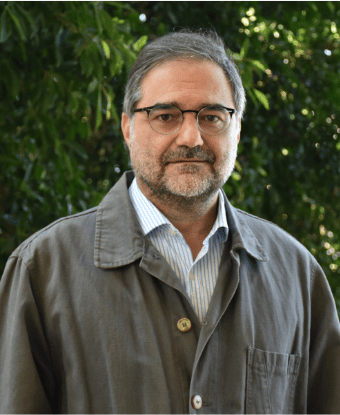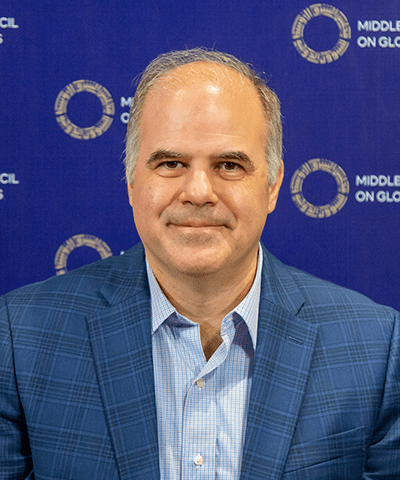MENA Think Tank Roundtable:
Improving Relevance and Impact at a Time of Mounting Global Uncertainty
February 4, 2023
Summary
The Middle East and North Africa (MENA) region faces complex issues, including conflict, inequality, and water scarcity, amid intensifying geopolitical competition and threat multipliers such as climate change. Think tanks play a critical role in generating policy solutions to these issues but must work creatively and collaboratively to navigate the uncertain terrain. Moreover, think tanks themselves face challenges, from connecting with decision-makers to securing operational resources while maintaining their autonomy. In response to these challenges, the Middle East Council on Global Affairs (ME Council) and the Issam Fares Institute for Public Policy and International Affairs (IFI) at the American University of Beirut (AUB) convened a roundtable think tank leaders from across the region. The roundtable consisted of five sessions held at the Center for International and Regional Studies (CIRS) at Georgetown University in Qatar (GU-Q). The distinguished participants assessed the opportunities and risks confronting their think tanks and the region.
The first session opened with a discussion about the changing policy landscape in the region. A participant identified three types of countries: fragile states, reasonably stable states facing serious development challenges, and GCC countries with unique challenges associated with decarbonization and the transition to a knowledge-based economy. Think tanks must carefully calibrate their recommended policy interventions for each of these different contexts. Participants then discussed the relevance and impact of think tanks. One speaker argued that, in order to increase their relevance, think tanks’ focus should shift from state-centric models inherited from the West towards greater engagement with civil society and produce research that is “by the region, for the region.” Another responded by noting the risk of think tanks becoming indistinguishable from non-governmental organizations (NGOs): “do tanks” rather than “think tanks.” Although there are unavoidable social responsibilities, think tanks’ primary purpose is to provide unbiased research to inform policy, not to advocate for particular causes. Others responded that think tanks can engage with both civil society and policymakers and must find a balance in order to remain relevant to both segments of society. In addition, there are situations where collaborating with the government is not feasible, either because of its dysfunctional nature or its compromised ethical standing. Changing social contracts and state-citizen relationships were also highlighted as a challenge, and the need for collaborative efforts among think tanks to generate solutions. The discussion also raised objections to the term “think tank,” with participants distinguishing between think tanks, academic centers, research institutions, and other institutional models.
In the second session, participants evaluated MENA think tanks’ performance and how it can be improved. Multiple speakers identified funding difficulties as a major constraint on performance. Think tanks that attempt to increase their autonomy can struggle financially; certain types of donors attempt to influence think tanks’ agendas and constrain their research output. Another issue raised is a lack of accessible data, either due to a lack of gathering or transparency issues. In response to these problems, participants raised several key solutions. One idea raised was to increase inter-institutional collaboration and establish a think tank network or consortium. Research topics, thematic and programmatic initiatives, and other projects can be discussed to avoid redundancy and to maximize think tanks’ collective resources. Participants pointed to specific areas that researchers can collaborate on, such as climate change, Palestine, and other regionally relevant issues. Ultimately, working collaboratively can improve data-sharing among think tanks, increase their collective impact and influence, and potentially mitigate funding issues.
The third session of the roundtable focused on navigating internal organizational challenges. Think tanks possess different capacities in terms of funding, relationships with the media, civil society, and governments. One participant mentioned that partnerships between more independent, small- and medium-sized think tanks can help reach a larger, more diverse audience and increase impact. Moreover, participants highlighted the role of technology in increasing efficiency, reaching a wider audience, and maximizing resource usage. Another speaker asserted that donors are becoming more likely to provide programmatic funding than to fund core operations. One think tanker present raised the possibility of paywalling research to address funding concerns. Others pushed back on this idea, arguing that paywalling research defeats the purpose of a think tank to produce and disseminate knowledge. Moreover, the notion of “by the region, for the region” necessitates prioritizing free and open access to publications and other outputs. Rather than follow the Western model, where think tanks are increasingly resembling consultancies and selling their analyses to corporate and government clients, MENA think tanks have an opportunity and responsibility to remain accessible to and trusted by the public.
The second day of the roundtable began with session four, which covered regional think tanks’ engagement with other actors within the wider policy ecosystem. Participants noted a gap between research and impact. Think tanks, one speaker stressed, need to earn their legitimacy and relevance by working on issues that matter to the general public, while also communicating these needs to political elites. Another added that policymakers should be involved early on in the research process to ensure that outputs are useful and policy relevant. In addition, it is critical for think tanks to increase the accessibility and simplicity of their research. One participant underscored the need for think tanks to engage stakeholders across the political and ideological spectrum to avoid being co-opted by special interest groups. To be effective, think tanks must communicate their research findings in a timely and accessible manner and engage effectively with the media to disseminate their work. Engaging with policymakers and civil society groups can inform think tanks’ research priorities and lead to more productive policy discussions.
The roundtable concluded with a fifth session to deliberate areas for potential collaboration among MENA think tanks and to set the agenda for subsequent meetings. Participants suggested alternating hosting responsibilities and locations going forward. They raised potential focuses for future collaborations, including issues from conflict and instability to climate change and the economy (energy transition) to Palestine and human security. To enrich their collaboration, they suggested creating a working group to organize the next meeting and determine the themes to be discussed. They also proposed creating a platform where their research is brought together without sacrificing their independence, thus increasing each think tank’s reach and impact. The discussion highlighted that the success of any collaborative venture lies in identifying clear areas of common interest, avoiding becoming too bureaucratic with the organizational structure, and securing sustainable funding. Finally, participants agreed that creating a network of MENA think tanks is crucial and should be prioritized moving forward.
Speaker













